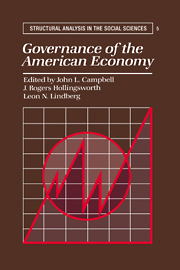Book contents
- Frontmatter
- Contents
- List of figures
- List of tables
- List of contributors
- Preface
- I Conceptual and historical foundations
- 1 Economic governance and the analysis of structural change in the American economy
- 2 The logic of coordinating American manufacturing sectors
- II Empirical studies of governance transformations in the United States
- III Theoretical evaluation of the empirical cases
- References
- Index
1 - Economic governance and the analysis of structural change in the American economy
Published online by Cambridge University Press: 21 March 2010
- Frontmatter
- Contents
- List of figures
- List of tables
- List of contributors
- Preface
- I Conceptual and historical foundations
- 1 Economic governance and the analysis of structural change in the American economy
- 2 The logic of coordinating American manufacturing sectors
- II Empirical studies of governance transformations in the United States
- III Theoretical evaluation of the empirical cases
- References
- Index
Summary
The institutions that govern economic activity in the United States have changed dramatically since the late nineteenth century and continue to do so as politicians, business leaders, and others scramble to cope with sluggish productivity, rapid technological change, volatile markets, increasing international competition, trade deficits, and a host of other problems that plague the economy. This book explains how and why these transformations in governance, the political and economic processes that coordinate activity among economic actors, occurred in different industries and industrial sectors. Although we seek to understand the dynamics of the U.S. economy, we also address questions about the governance of modern capitalist economies in general by focusing on the emergence and rearrangement of several common institutional forms of governance, or governance mechanisms, which include markets, bureaucratic hierarchies, associations, and informal networks. We add further breadth to the analysis by discussing the unique role that the state plays in the governance transformation process.
Of course, social scientists have adopted a wide-ranging set of theoretical positions to explain transformations in governance. Those following Adam Smith, John Stuart Mill, and the neoclassical economic tradition adopted a utilitarian view and suggested that governance transformations occur when rationally calculating economic actors see that alternative forms of governance offer more profitable ways of doing business than those already in place (e.g., Williamson 1975, 1985, 1986). Others followed an organizational approach, reminiscent of Max Weber, and suggested that a broader set of motivations and organizational goals, such as a sense of community and reciprocity, also influence governance transformations (e.g., Granovetter 1985).
- Type
- Chapter
- Information
- Governance of the American Economy , pp. 3 - 34Publisher: Cambridge University PressPrint publication year: 1991
- 80
- Cited by



